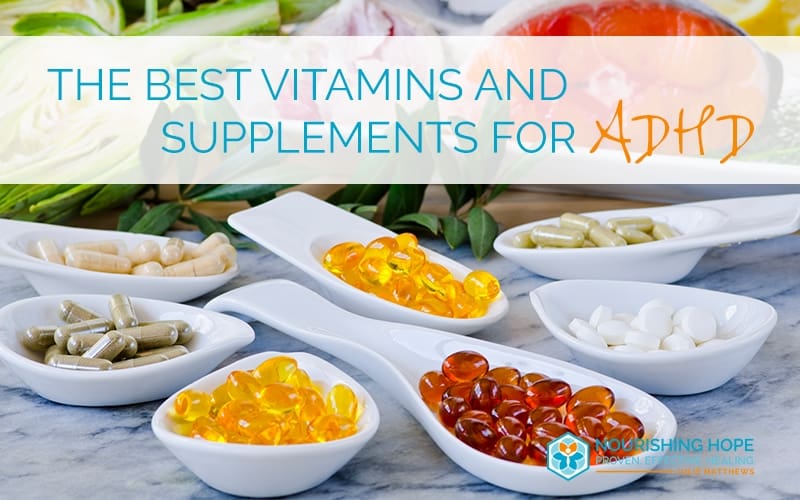Did you know that what influences ADHD is more than the brain?
ADHD is a “whole body” condition – what’s happening in the body affects how well the brain functions, and thus influences the presence and severity of ADHD symptoms.
What’s amazing is that you can positively affect body and brain – with nutrition. By taking charge of your child’s food and nutrition intake, you can naturally provide them relief, and (if you wish) avoid strong pharmaceuticals that have side effects and do not address the root cause.
Families and physicians around the world are realizing this, now you know too!
ADHD is a complex neurological condition.
Fortunately, when we understand that ADHD is a whole body condition we can begin by addressing the body to influence the brain.
The biochemistry and underlying factors in the body affect the brain, learning, attention, and behavior, and we can influence those through nutrition.
Let’s discuss some important nutrients in ADHD.
Magnesium and B6
Magnesium is a good place to start. Magnesium is important for muscle relaxation, energy production, and activating enzymes –there are over 300 functions in the human body that involve magnesium. Parents often notice that supplementing magnesium aids sleep and helps reduce tics, anxiety, hyperactivity, and depression in their child.
Studies have shown that magnesium is low in children with ADHD and that supplementation can improve blood levels and significantly decrease hyperactivity.1 In another study, a combination of magnesium and vitamin B6 produced similar results.2
B6 helps convert folate to the active form in the folate cycle and is important for methylation.
Magnesium intake requirements vary from about 130- 400 mg (or more) depending on the age and needs of the child. Professionals have differing opinions on how much magnesium to supplement in relation to calcium – recommendations for the ratio of calcium to magnesium range widely from 2:1, 1:1, and 1:2.
Zinc
Zinc is another important nutrient, and used it also used in more than 300 enzyme reactions. It has many uses in the body from: growth and repair to immune and antioxidant support. And it’s important in the brain, including that it regulates neuronal excitability. Zinc is also a very important co-factor for converting B6 into its active form (P5P). And P5P helps create neurotransmitters like serotonin.
As we discuss below, serotonin is important in executive function and social behavior, as well as mood/happiness, factors in ADHD.
And on a biochemical level we see children with ADHD significantly lower levels of zinc.3,4 . And studies show supplementation with zinc improves ADHD.5
Zinc is a good supplement to try with ADHD. Just be careful to consume it with food, as it can cause nausea on an empty stomach.
Folate and B12
Folate is an important B vitamin. Particularly because it’s a crucial step at the beginning of the methylation cycle. Methylation handles so many things including myelination of the nerves, allergy response, energy production, and neurotransmitter levels. And Vitamin B12 is an important part of methylation as well as it is the link between the folate cycle and the methylation cycle.
MTHFR (5, 10-methylenetetrahydrofolate reductase) gene variants are common in ADHD.6 Meaning it is likely folate levels will be low in the child with ADHD, as poor MTHFR function can cause low folate. And folate is crucial for neurotransmitters like serotonin and dopamine. As such supplementing folate may help ADHD
Vitamin A and D
Fat-soluble vitamins stem primarily from the fat content of animal foods. You don’t find them in plant foods in high amounts because it’s animals that create them. Cows convert beta-carotene to vitamin A, and convert sunlight into vitamin D. Animal fats and foods are rich sources of these vitamins, they include: dairy, beef, lard, bacon, liver, cod liver oil, and fish eggs. Note: Every human culture throughout time included some form of animal protein/fat in their diet. Since some people do not get enough vitamin D, supplementation can really help. Vitamin D alone has been linked to ADHD; particularly, related to maternal supplementation.
And vitamin D supplementation along with omega-3 fatty acids has been shown to improve ADHD. This is because these nutrients control serotonin production, and serotonin regulates executive function, sensory gating, and social behavior: three factors found in ADHD and impulsive behavior. Omega-3 can improve symptoms. so researchers have recommended vitamin D and omega-3 to reduce rates of ADHD in the population.7
Omega-3 and omega-6 fatty acids
In addition to the study on vitamin D and omega-3s, there are more studies on omega-3 by itself, as well as in combination with omega-6.
Furthermore, Omega-3 and omega-6 have been found to be low in children with ADHD and that supplementation improves symptoms. And studies have found a reduction in hyperactivity and inattentiveness from omega-3 supplementation.8
Omega-3 is most readily found in fish and fish oil in our diet. However, since many children do not consume enough, supplementation can be helpful.
Multivitamin-mineral
The great thing about a multivitamin-mineral formula is that they contain all of the above nutrients, except the fatty acids. Although, sometimes not am optimal full dose.
Since they contain a wide range of nutrients including magnesium, zinc, folate, and all the vitamins and minerals described here, it would make sense that a multivitamin-mineral could improve the symptoms of ADHD. And in fact, the research shows that it does, including adults with ADHD.9,10
And in our diet and nutrition study on children with autism, that included a multivitamin-mineral formula and a healthy gluten-free, dairy-free and soy-free diet, we found significant improvement with in hyperactivity, as well as attention/focus.11
Food vs. Supplements
While it’s always best to get our nutrients from whole foods, that’s not always possible. There are issues with food supply access and quality, and picky eating is very common with autism and ADHD.
Some children’s biochemical imbalances require greater nutrition (to help restore balance) than food alone can provide, or there may be a blocked/inhibited biochemical pathway that requires an active form of a nutrient to supply what the body and brain need.
Ensuring good nutrition for a specialized (therapeutic) diet can be complex; there are many considerations of food choices and ways to augment mineral and vitamin needs.
All nutrients are crucial, and balance is important. Feeding your child a whole foods diet will go a long way to meeting their nutritional needs. Then supplement wisely, and as needed, to reach an optimal nutrient level for your child.
Download my guide, The 6 Nutrition Essentials for Improving Health, Learning, and Behavior in Your Child – it include 6 steps including “Supplement Wisely” – along with other nutrition strategies for improving ADHD.
Share your experience with us. Which vitamins, minerals, fatty acids, and other supplements have made the most difference for you or your child?
1 Starobrat-Hermelin, B., and T. Kozielec. “The effects of magnesium physiological supplementation on hyperactivity in children with attention deficit hyperactivity disorder (ADHD). Positive response to magnesium oral loading test.” Magnesium research 10.2 (1997): 149-156.
2 Mousain-Bosc, Marianne, et al. “Magnesium VitB6 intake reduces central nervous system hyperexcitability in children.” Journal of the American College of Nutrition 23.5 (2004): 545S-548S.
3 Bekaroǧlu, Mehmet, et al. “Relationships between serum free fatty acids and zinc, and attention deficit hyperactivity disorder: a research note.” Journal of Child Psychology and Psychiatry37.2 (1996): 225-227.
4 Arnold, L. Eugene, et al. “Serum zinc correlates with parent-and teacher-rated inattention in children with attention-deficit/hyperactivity disorder.” Journal of Child & Adolescent Psychopharmacology 15.4 (2005): 628-636.
5 Dodig-Curković, K., et al. “The role of zinc in the treatment of hyperactivity disorder in children.” Acta medica Croatica: casopis Hravatske akademije medicinskih znanosti 63.4 (2009): 307-313.
6 Spellicy, Catherine J., et al. “Folate metabolism gene 5, 10-methylenetetrahydrofolate reductase (MTHFR) is associated with ADHD in myelomeningocele patients.” PloS one 7.12 (2012): e51330.
7 Patrick, Rhonda P., and Bruce N. Ames. “Vitamin D and the omega-3 fatty acids control serotonin synthesis and action, part 2: relevance for ADHD, bipolar disorder, schizophrenia, and impulsive behavior.” The FASEB Journal 29.6 (2015): 2207-2222
8 Hawkey, Elizabeth, and Joel T. Nigg. “Omega− 3 fatty acid and ADHD: Blood level analysis and meta-analytic extension of supplementation trials.” Clinical Psychology Review 34.6 (2014): 496-505.
9 Rucklidge, Julia J., et al. “Vitamin–Mineral Treatment of ADHD in Adults: A 1-Year Naturalistic Follow-Up of a Randomized Controlled Trial.” Journal of attention disorders 21.6 (2017): 522-532
10 Rucklidge, Julia J., et al. “Vitamin–mineral treatment of attention-deficit hyperactivity disorder in adults: double-blind randomised placebo-controlled trial.” The British Journal of Psychiatry 204.4 (2014): 306-315.
11 Adams J.B., Audhya T., Geis E., Gehn E., Fimbres V., Pollard E.L., Mitchell J., Ingram J., Hellmers R., Laake D., Matthews J.S., Li K., Naviaux J.C., Naviaux R.K., Adams R.L., Coleman D.M., Quig D.W.. Comprehensive Nutritional and Dietary Intervention for Autism Spectrum Disorder-A Randomized, Controlled 12-Month Trial. Nutrients. 2018 Mar 17;10(3). pii: E369.





I have found the amino acids tyrosine and Theanine to be particularly useful for both children and adults with ADHD. Tyrosine can increase focus, motivation and energy, while Theanine can reduce the anxiety that leads to the experience of spinning from one task to another and then becoming so overwhelmed that they run away from the task or procrastinate. What amino acids have you found to be useful?
Thanks so much for sharing your experience Christina. It’s great to hear what’s helping others. I found there are a number of useful supplements and amino acids, but that they need to be personalized.
Great article! We do the supplements and a GF diet, how big a piece is the dairy free and soy free piece of it?
Hi Becky, Good question. It depends on the person, but my experience is that since the three foods have biochemistry and underlying conditions in common, eliminating all of the “irritants” (gluten, casein, and soy) is often beneficial.
Becky, you might find this article I wrote on gluten and dairy free helpful… https://nourishinghope.com/gluten-free-and-dairy-free-diet-for-autism/
Thanks for this article. Can you recommend a brand of multivitamin-mineral? I usually have good luck with gummies or chewables. Anything in pill form that needs to be swallowed is harder.
Fantastic article although you missed the most important vitamin for children with ADHD and that’s niacin vitamin B3, yes it causes a flush but after two to three weeks this is no longer an issue as the body becomes used to it. I started with 50mg to start, three time a day, now he’s taking 500 mg three times a day and he is almost an angel in school now and his grades have dramatically improved.
This is a great article, thank you. I am a 60 year old woman, and I have recently been diagnosed with ADHD. Do you have any of this information geared toward adults?
Welcome Cheryl-Anne! There are certainly differences between the nutritional needs of someone 6 vs. 60 years old. However, some of the nutritional needs and underlying conditions can be similar for similar mental health needs. A good nutritionist or functional medicine doctor could help you determine which of these might apply and what differences there are for you individually… a bioindividual nutrition approach. I’ll also consider writing an article for adults.